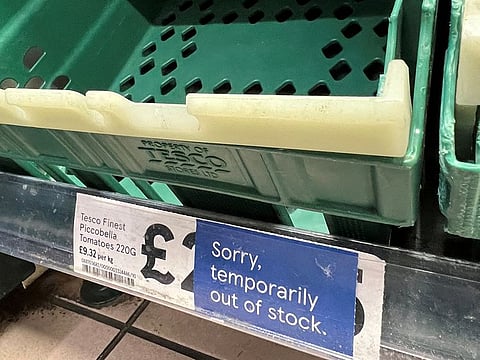Salad shortages on UK shelves spark Brexit blame game
Environment secretary says the problem will last for another two-four weeks

An acute shortage of salad items on UK supermarket shelves has sparked a political debate, with some people in the industry blaming Brexit while others say it’s a “smokescreen” for different problems.
Shortages of tomatoes, cucumbers and peppers have also been experienced in other parts of Europe, but Britain is the worst-affected country with four major supermarkets including Tesco Plc and Morrisons rationing purchases.
Environment Secretary Therese Coffey said on Thursday that the problem “will last another two to four weeks” and suggested Britons could eat seasonal vegetables such as turnips instead. She blamed “unusual weather incidents”, referring to recent cold weather in Spain and North Africa. Morocco, in particular, has been hit by snow storms.
Still, former J Sainsbury Plc boss Justin King said the UK food sector has been “significantly disrupted by Brexit”. He told the BBC that the government was also to blame for failing to subsidise energy usage in greenhouses over the winter.
Greenhouses themselves have been hurt by the UK’s departure from the European Union, King said this week. “There is a genuine shortage but we did rather bring this problem upon ourselves.”
The National Farmers’ Union also called for the government to provide more support to parts of the UK’s agricultural sector that require high amounts of energy. “If you don’t take domestic food production seriously, you’re going to produce less of it,” said Minette Batters, president of the NFU, at the group’s conference in Birmingham on Wednesday.
Liz Webster from campaign group Save British Food also told LBC radio that the shortages were due to “Brexit decisions”.
Low prices
There’s another dynamic beyond Brexit that’s particular to the UK - a highly competitive supermarket industry which is often accused of squeezing suppliers to keep prices low. Compared with consumers in the EU, British shoppers dedicate less of their household spending on food.
“Brexit is a bit of a smokescreen here,” said Jack Ward, CEO of the British Growers Association. “The UK food retailing system is probably the most competitive anywhere in the world. It’s about what growers get back in return.”
Poor harvests in Spain and Morocco are still part of the story, but a key issue is the impact of inflation on growers in the UK, according to Ward. He said that greenhouses normally used to grow tomatoes, peppers and cucumbers were left vacant because it hasn’t been economical to pay the higher energy costs.
Higher labour costs have also made it more expensive to grow salad items, and it’s risky as the produce is prone to pests and diseases, said Ward. In some cases growers are choosing to plant wheat instead as it’s less costly and pays more.
The supply of tomatoes and cucumbers is expected to fall to the lowest level since records began in 1985, according to the NFU.
Rationing
The shortages have led Tesco, Aldi and Asda to limit purchases to three units per person in the UK while Morrisons has introduced a cap of two. Asda has gone the furthest with restrictions across tomatoes, peppers, cucumbers, lettuce, salad bags, broccoli, cauliflower and raspberries. The British Retail Consortium has warned that the disruption is expected to last weeks.
British shoppers have shared images of empty shelves on Twitter while on the continent consumers in France, Netherlands, Spain, Italy and Bulgaria are showing photos and video tours of supermarkets with plentiful supply, boxes full to the brim with tomatoes. On Thursday morning #BrexitFoodShortages was trending on Twitter.
However, Irish stores also have a shortage of some fruit and vegetables stemming from Spain and north Africa and retailers are looking at alternative sources of supply.
In Denmark, the second-largest supermarket chain Coop is short of cucumbers, tomatoes, lettuce, bell peppers and aubergines due to lower deliveries from Spain, though the grocer hasn’t started rationing. Another chain in Denmark, REMA 1000, has similar shortages and expects the issues to persist for several weeks, while there have been reports of higher prices due to supply constraints in the Netherlands.
In Sweden, supermarket ICA Gruppen is finding it challenging to get full volumes of fruit and vegetables but the situation is manageable, said Jonas Andersson, head of fruit and vegetables at ICA Sverige.
In the UK, it’s the second instance of widespread rationing in the space of four months. In November almost every major supermarket capped purchases on eggs after the higher cost of chicken feed and an outbreak of bird flu led to a dearth of supply.



